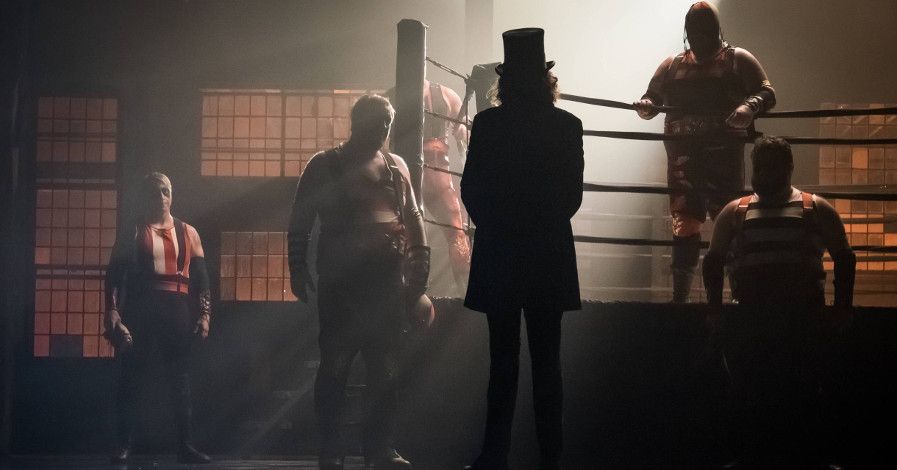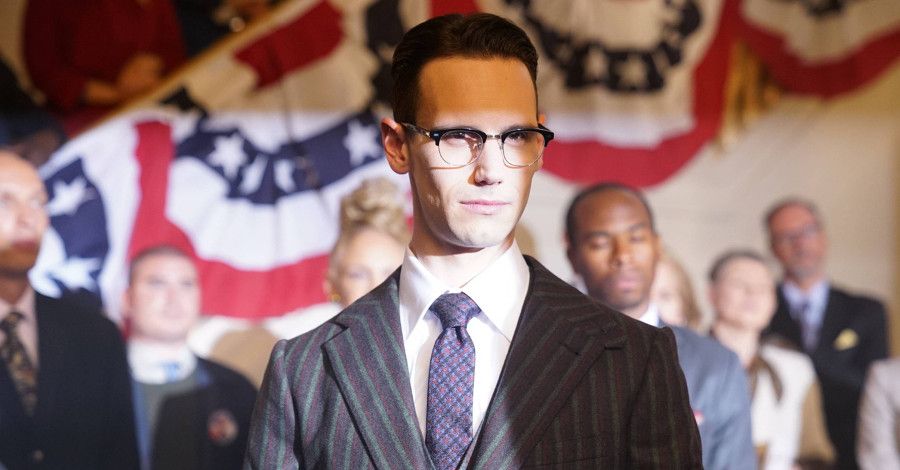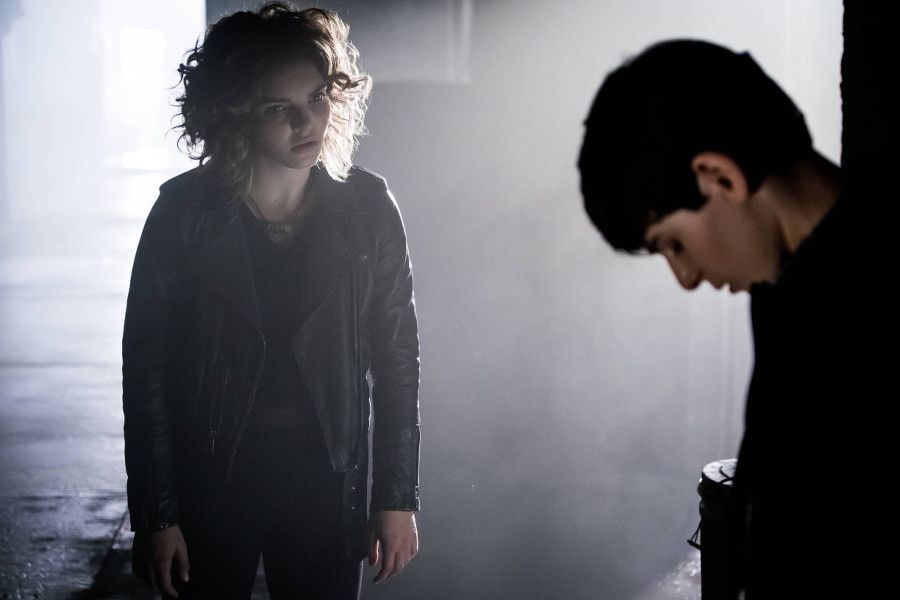Fox's pre-Batman drama "Gotham" has always been a pretty one-dimensional affair, but if you squint past its clunkier stereotypes, at least the one dimension of its recent episodes is fun.
With Tonight's latest installment in the increasingly more applicable "Mad City" saga – titled "New Day Rising" for those keeping score – the show has settled into its new year with the same predictable plots. But a funny thing happens on the way to the doldrums: the series' veteran cast finally starts to feel comfortable in its cartoonish skin.
Take the episode's blunt A-plot – the Mad Hatter's quest to steal back his abused sister Alice from the G.C.P.D. – and you'll see lolloping twist on "Gotham's" standard supervillainy. Like almost every bad guy we've seen on the series to date, the Hatter may be a one-note villain, but at least the show is hitting that note spot on without any pitch problems. Benedict Samuel chews scenery in the part like he's working a Renaissance Festival and gleefully recruits the latest D-list Batman villains to his cause: the Tweed family of buffoonish, overweight wrestlers. Led by Deever and Dumfrey (the Golden Age villains known in the comics as Tweedledee and Tweedledum) the third-rate luchadores have no personality that isn't stated outright ("That one doesn't talk!"...sure, whatever, okay). But when they strong arm their way into precinct headquarters like a dozen other villains before them, at least the circus atmosphere of the fight is funny to watch. No one seems to be taking the plot or its execution too seriously, and that is a surprisingly good thing.
On the supposedly more serious side of the equation, Jim Gordon is still haunted by Tetch's hypnotic interference from last week's episode as he attempts to get Alice to open up about her own issues. While the exact manner of the Hatter's powers remain befuddlingly vague (so are they a superpower or what), the idea of Gordon being slightly suicidal over the wreck is life has become fits well enough with the wringer the show's writers have put him through. And usually weak link in the cast Ben McKenzie is oddly effective as zombified Jim – wandering through the advice of his former boss and ex lovers with a dazed eyes of a broken man. Similarly, Alice's own fear of her brother and explanation of how her blood "brings out the true nature" of whomever it touches may be flat as roadkill, but at least it zips by quickly on its way to pulpier thrills like the "gun on the mantlepiece" question of who will get infected by the many vials drawn from her over the hour.
That mix of strong character work from the main cast and forgettable if unobtrusive supporting players extends to the rapidfire plot of Penguin's run for mayor. After seemingly days of campaigning, the big vote is already upon the city, and the simmering battle isn't between Oswald and his political rival but recent Arkham escapee Ed Nygma and longtime major domo Butch. The latter has been greasing the palms of city election officials while Riddler pushes for an honest campaign for the now man of the people. Of course, at first Penguin balks at playing the straight and narrow, but when Eddie pulls back the bribes against his savior's wishes, a well-deserved electoral victory buries the hatchet between the two future villains and places another one between Riddler and Butch.
The pivots here can be seen from a mile away, but what's delightful is the way the main cast leans into the lunacy. When Penguin tells his riddling pal "Arkham has made us both stronger," the rare spark of success for the show's origin-heavy nature is there. Of course the madhouse is a symbol of strength for two men on the razor's edge of total costumed insanity. And both actor's play the idea with relish – particularly Cory Michael Smith as Nygma who deserves a "Most Improved Player" trophy for the turnaround he's made as a performer since his grating presence in Season 1. Elsewhere, while Butch may be surrounded by bit players who range from mannequin-level dullness to potentially offensive ethnic stereotypes, his glower at Riddler holds some real menace. The future of this story looks both bright and bloody.
Lastly – and most shockingly – the young stars of the show find a way to turn around what could have been a dismal direction for Bruce Wayne's future. The renegade duplicate of the boy billionaire was a ridiculous proposition even for this show, but somehow David Mazouz has made the idea work with a little help from the increasingly impressive Camren Bicondova as Selina Kyle. When the suspicious faux-Bruce dispatches another set of stupidly clichéd mob types to save Selina, the pair of kids come clean with each other and share a suitably awkward teen kiss. Mazouz only has a change in how is bangs are combed and the slight drop of his voice to mark the difference, but the confidence he brings to the dueling parts make each Bruce feel unique. And pitting the boys against each other over Selina rather than some dopey "I want to be YOU!" plot as it seemed the show might last week keeps the silliness grounded enough to take.
Best of all, the action-oriented part that faux-Bruce plays both in his rescue of Selina and his exit from the real Wayne's life returns this story to its best footing: the origin of the Dark Knight. When the clone confidently sneers at his genetic donor and drops off a rooftop with ease, it's the closest we've ever seen any Wayne on this show feeling like the real Batman. The look fits the character so well that the late game twist of him being snatched up by the Court of Owls heightens the anticipation for his return rather than relieve us that he'll be off stage for a while.
But what's best of all in the episode is that the strong, if goofy performances by these top-level players are only the tip of the iceberg in the hour. Erin Richards challenges Smith for that "Most Improved" award each week as the nutty nightclub version of Barbara, and with his one-liners and comical hustling of a Tweed brother in the interrogation room, the great Donal Logue FINALLY has some charming material in his hands as Harvey Bullock. If "Gotham" can keep this sense of affable if predictable character in place all season, the show might become entertaining rather than draining.
However, the finale of the episode poses questions to that status as much as it reinforces them. When Gordon and Bullock track down the Hatter's gang to an abandoned warehouse, Jim just overcomes his programming and finds a reason to keep living. Of course, in the crossfire Alice falls to her death prompting Tetch to cry "You killed her!" with all the originality of first semester student film. Shifting the Hatter's modus operandi to pure vengeance could easily derail the fun of the character in the weeks ahead. Similarly, when the "Alice's blood" gun goes off, it's right in the face of Gordon's supposedly haunted former boss Captain Barnes. At one point in time, Michael Chiklis was a top-level TV performer, but years of subpar superhero work have not been kind to the Commish. The flickering realization that he's been doused with Alice's blood was a good moment for the actor, but how that plays out on a show like "Gotham" is anyone's guess. Here's hoping the core cast continues to bring their A game to this C material.



